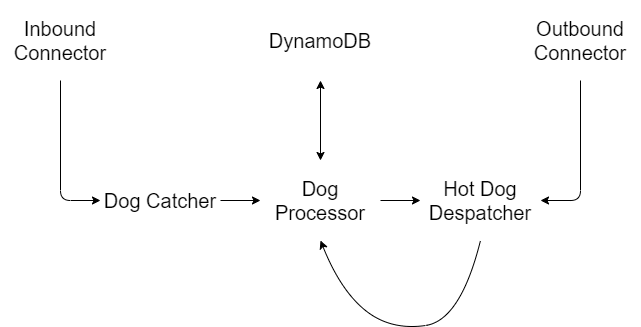30
Localstack with Terraform and Docker for running AWS locally
Hello everyone, in this post I will be demonstrating how you can run localstack with Terraform and Docker and give you a proof of concept go application so you can tweak it according to your logic and follow anything you want to do such as integration/system tests for AWS services in your own CI/CD or localhost.
Github Repository for PoC(proof of concept):
hotdog-PoC-repository
hotdog-PoC-repository
Requirements:
Localstack is a testing/mocking framework for developing Cloud applications locally. Where in theory, you can stick any AWS service and emulate them in localhost without ever needing the real AWS account.
Localstack’s primary goal to make integration/system testing less painful for developers.
Localstack’s primary goal to make integration/system testing less painful for developers.

Aside from lambdas, I had 3 kinesis streams and 3 kinesis triggers in order to make lambdas talk to each other. The named kinesis streams is as follows; caughtDogs, hotDogs, eatenHotDogs.
version: '3.8'
services:
localstack:
container_name: "localstack_main"
image: localstack/localstack:latest
environment:
- SERVICES=dynamodb,lambda,kinesis
- LAMBDA_EXECUTOR=docker_reuse
- DOCKER_HOST=unix:///var/run/docker.sock
- DEFAULT_REGION=ap-southeast-2
- DEBUG=1
- DATA_DIR=/tmp/localstack/data
- PORT_WEB_UI=8080
- LAMBDA_DOCKER_NETWORK=localstack-tutorial
- KINESIS_PROVIDER=kinesalite
ports:
- "53:53"
- "53:53/udp"
- "443:443"
- "4566:4566"
- "4571:4571"
- "8080:8080"
volumes:
- /var/run/docker.sock:/var/run/docker.sock
- localstack_data:/tmp/localstack/data
networks:
default:
volumes:
localstack_data:
networks:
default:
external:
name: localstack-tutorialdocker-compose up -d --buildprovider "aws" {
region = "ap-southeast-2"
access_key = "fake"
secret_key = "fake"
skip_credentials_validation = true
skip_metadata_api_check = true
skip_requesting_account_id = true
endpoints {
dynamodb = "http://localhost:4566"
lambda = "http://localhost:4566"
kinesis = "http://localhost:4566"
}
}
// DYNAMODB TABLES
resource "aws_dynamodb_table" "dogs" {
name = "dogs"
read_capacity = "20"
write_capacity = "20"
hash_key = "ID"
attribute {
name = "ID"
type = "S"
}
}
// KINESIS STREAMS
resource "aws_kinesis_stream" "caught_dogs_stream" {
name = "caughtDogs"
shard_count = 1
retention_period = 30
shard_level_metrics = [
"IncomingBytes",
"OutgoingBytes",
]
}
resource "aws_kinesis_stream" "hot_dogs_stream" {
name = "hotDogs"
shard_count = 1
retention_period = 30
shard_level_metrics = [
"IncomingBytes",
"OutgoingBytes",
]
}
resource "aws_kinesis_stream" "eaten_hot_dogs_stream" {
name="eatenHotDogs"
shard_count = 1
retention_period = 30
shard_level_metrics = [
"IncomingBytes",
"OutgoingBytes",
]
}
// LAMBDA FUNCTIONS
resource "aws_lambda_function" "dog_catcher_lambda" {
function_name = "dogCatcher"
filename = "dogCatcher.zip"
handler = "main"
role = "fake_role"
runtime = "go1.x"
timeout = 5
memory_size = 128
}
resource "aws_lambda_function" "dog_processor_lambda" {
function_name = "dogProcessor"
filename = "dogProcessor.zip"
handler = "main"
role = "fake_role"
runtime = "go1.x"
timeout = 5
memory_size = 128
}
resource "aws_lambda_function" "hot_dog_despatcher_lambda" {
function_name = "hotDogDespatcher"
filename = "hotDogDespatcher.zip"
handler = "main"
role = "fake_role"
runtime = "go1.x"
timeout = 5
memory_size = 128
}
// LAMBDA TRIGGERS
resource "aws_lambda_event_source_mapping" "dog_processor_trigger" {
event_source_arn = aws_kinesis_stream.caught_dogs_stream.arn
function_name = "dogProcessor"
batch_size = 1
starting_position = "LATEST"
enabled = true
maximum_record_age_in_seconds = 604800
}
resource "aws_lambda_event_source_mapping" "dog_processor_trigger_2" {
event_source_arn = aws_kinesis_stream.eaten_hot_dogs_stream.arn
function_name = "dogProcessor"
batch_size = 1
starting_position = "LATEST"
enabled = true
maximum_record_age_in_seconds = 604800
}
resource "aws_lambda_event_source_mapping" "hot_dog_despatcher_trigger" {
event_source_arn = aws_kinesis_stream.hot_dogs_stream.arn
function_name = "hotDogDespatcher"
batch_size = 1
starting_position = "LATEST"
enabled = true
maximum_record_age_in_seconds = 604800
}./zip-it.sh
terraform init
terraform plan
terraform apply --auto-approve
aws lambda invoke --function-name dogCatcher --endpoint-url=http://localhost:4566 --payload '{"quantity": 2}' output.txtaws dynamodb scan --endpoint-url http://localhost:4566 --table-name dogs
I had pretty much great experience with Localstack. I think even though Localstack is quite new, it seems like it can be used for learning AWS SDKs as a developer without actually using live AWS services and getting billed for it. This can also speed up developer's integration tests(along with CI/CD) and debugging processes if configured properly because there are many services Localstack provides and I have only configured and used 3 of them here. This also saves lots of costs for any companies.
Also don't forget to check out Localstack's slack channel, they are really helpful for any issues you run into and follow me on Twitter for further questions!
localstack-slack
my-twitter
localstack-slack
my-twitter
30
